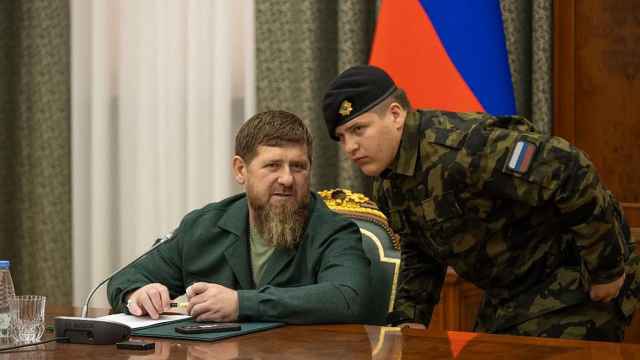As the death toll rises in Syria's Arab Spring and the regime of President Bashar Assad becomes increasingly isolated on the world stage, Russian companies in Syria are losing out financially.
As well as lucrative arms contracts, Russian firms have a substantial presence in the Syrian infrastructure, energy and tourism industries. And with exports to Syria worth $1.1 billion in 2010 and investment in the country valued at $19.4 billion in 2009, there is a lot at stake.
"All our deliveries to Syria have come to a standstill," said Anton Kudratyev, director of sales with Uralmash's Drilling Equipment Holding, a company that has exported to Syria for 14 years.
"One has to be physically present in this market and be able to talk to people — and because of the current security situation we have been deprived of this possibility."
According to United Nations estimates, more than 2,200 demonstrators have been killed in the protest movement that has swelled against Assad since March. The Syrian government, which does not allow journalists into the country, has reportedly used snipers, tanks and heavy artillery against protesters.
Sergei Makarov, director of Stroitransgaz — a gas facility construction business that has the largest Russian operation in Syria — told The Moscow Times that despite the violence their work was proceeding without significant interruptions.
But he added that the company had experienced problems with European suppliers who failed to deliver the equipment they were obligated to provide, transport companies who raised their tariffs and breakdowns in the banking sector.
Engaged in projects worth $1.1 billion, Stroitransgaz has 80 Russian staff on the ground in Syria. It is building a natural gas processing plant 200 kilometers east of Homs in the Al-Raqqa region and is involved in technical support for the Arab Gas Pipeline and another natural gas processing plant in the center of the country.
Makarov added that the company had taken extra security measures for the safety of its employees, saying, "If Russia announces an evacuation of its citizens, we are ready."
Other Russian businesses, however, said that the protests sweeping Syria had little effect on their work. Nikolai Grishenko, director of Sovintervod, a water engineering company, said he was in daily contact with his 20-man team in Aleppo, which has experienced no disruption.
Sovintervod has been working in Syria for more than 50 years. Grishenko added that Assad was a "decent man" and compared today's protests to the 1980s civil unrest in Syria, which was successfully crushed by the government at the cost of up to 25,000 dead and wounded civilians.
Tatarstan-based oil producer Tatneft is the most significant Russian energy firm in Syria. The company began pumping Syrian oil in April 2010 through a joint venture with Syria's national oil company and said in January that it would spend $12.8 million drilling exploratory wells near the Iraqi border. Tatneft representatives did not respond to requests for comment.
While Russian companies already on the ground in Syria have been suffering to varying degrees, firms with expansion plans in the region have been put off by the recent upheaval.
In February, state-run utility giant Inter RAO announced a $500 million plan to expand in countries across the Middle East, including Syria. But a spokesman for the company told The Moscow Times Tuesday that Inter RAO currently had no links with Syria and no intention of working there.
The current inconveniences to Russian businesses pale in comparison to the chaos that would result if the Assad government was forced violently from power.
According to data from the Moscow Defense Brief, the capital has more than $4 billion in active arms contracts with Syria, including MiG-29 fighters, Pantsir surface-to-air missiles, artillery systems and anti-tank weaponry. Syria also hosts Russia's only naval base in the Mediterranean, at Tartus.
Kremlin diplomats are determined to avoid a replay of the Libyan scenario in which a NATO-led force facilitated the toppling of Moammar Gadhafi. It will be up to the new government in Libya to decide whether it honors the estimated $10 billion worth of business contracts Russia had with Gadhafi's regime.
Though it has condemned the violence against demonstrators in Syria, Russia is also resisting international calls for new economic sanctions by the UN.
But efforts to ratchet up the external pressure on the Assad government are likely to continue regardless. A European Union ban on an annual $3 billion of Syrian oil exports to Europe, from which Assad's government derives about one-third of its revenue, is expected to be in place by this weekend. The United States already has an oil embargo and investment ban in place.
Meanwhile, protests are continuing on the Syrian streets. Reports of violence with at least seven fatalities in Damascus, Deraa and Al-Harra accompanied the festival of Eid al-Fitr Tuesday.
"The main question at the moment is whether the current leadership will hold out or not," said Uralmash's Kudryatev.
"If they don't … it could lead to the collapse of the country accompanied by all sorts of lawlessness."
A Message from The Moscow Times:
Dear readers,
We are facing unprecedented challenges. Russia's Prosecutor General's Office has designated The Moscow Times as an "undesirable" organization, criminalizing our work and putting our staff at risk of prosecution. This follows our earlier unjust labeling as a "foreign agent."
These actions are direct attempts to silence independent journalism in Russia. The authorities claim our work "discredits the decisions of the Russian leadership." We see things differently: we strive to provide accurate, unbiased reporting on Russia.
We, the journalists of The Moscow Times, refuse to be silenced. But to continue our work, we need your help.
Your support, no matter how small, makes a world of difference. If you can, please support us monthly starting from just $2. It's quick to set up, and every contribution makes a significant impact.
By supporting The Moscow Times, you're defending open, independent journalism in the face of repression. Thank you for standing with us.
Remind me later.






